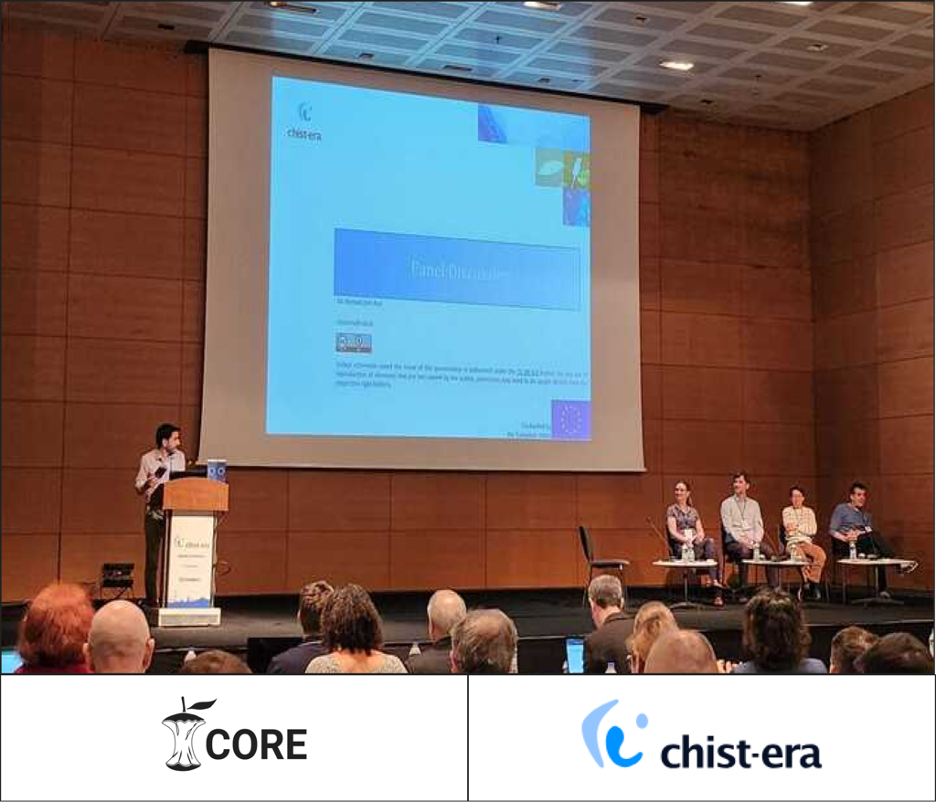Professor Petr Knoth was selected by the CHIST-ERA organisers as one of four Open Science panellists in the first part of the Seminar. The other panelists included David Camacho (Universidad Politécnica de Madrid, Project MARTINI & Open Science Ambassador), Sabine Kraml (Université Grenoble Alpes, Project OpenMAPP & Open Science Ambassador), and Joanna Watt (EPSRC, UKRI, Research Funding Agency representative). The panel discussed the main challenges and gaps in Open Science. Among these, Professor Knoth particularly highlighted:
Lack of Interoperability and Machine-Actionable Metadata
Despite the growth of Open Science, repositories and data platforms often fail to use metadata consistently, making integration and reuse challenging. There is also a lack of standards, such as those relating to licensing for machine-actionable metadata, and where standards do exist, they are often insufficiently adopted.
Green Open Access Underfunded Despite Being More Cost-Effective
Green Open Access, where authors deposit copies of their papers in repositories, is significantly cheaper than Gold Open Access (where authors pay APCs to publish in OA journals). On average, APCs range from €1,000–€3,000 per article, whereas depositing in a repository costs under €50 when scaled across institutions. Yet, funding overwhelmingly favours publishers and APC-based models, while critical infrastructure like repositories remains underfunded.
Lack of Recognition for Infrastructure Contributions
Funders tend to focus on supporting new projects with funding limited to a specified period of time. There are few opportunities for key scholarly infrastructures maintained by academics to receive stable funding or institutional recognition, even though they are essential to Open Science.
Evaluation and Incentive Misalignment
Open Science cannot succeed unless it addresses the “elephant in the room”: recognition. Researchers are still assessed largely by where they publish, not by what or how they contribute. Contributions to research data and software are not recognised to the same extent as contributions to manuscripts. This skews incentives away from open practices, data sharing, reproducibility, and collaborative tool-building.
Representing The Open University, Professor Knoth also presented the latest developments from the SoFAIR project—a CHIST-ERA-funded initiative aimed at making research software truly FAIR: Findable, Accessible, Interoperable, and Reusable.
While most Open Science discussions focus on publications and datasets, SoFAIR tackles an often-overlooked element: research software. Research software is an essential precondition for achieving research reproducibility. Reproducibility is a cornerstone of scientific progress, based on the principle that by repeating a scientific experiment, we should arrive at the same conclusions. If this condition is not met, how can society place trust in research?
Making Software Discoverable—By Design
The SoFAIR team, in collaboration with institutions across Europe, has been building a semi-automated workflow that uses AI to identify software mentions in research papers, validate them, and archive them for future use. This work is now being embedded into CORE’s global infrastructure, which indexes over 250 million open access research outputs and supports discovery tools used by millions each month.
By leveraging CORE’s reach, SoFAIR is not only improving the visibility of research software but also contributing to a more reproducible and transparent research ecosystem—one where vital digital artefacts do not get lost in the fine print.
Why Infrastructure Matters
Beyond the technical solutions, Professor Knoth used the platform to highlight systemic issues holding Open Science back: the underfunding of Green Open Access models, a continued lack of institutional support for foundational services like CORE, and incentive systems that undervalue infrastructure contributions compared to journal publications.
The CHIST-ERA Projects Seminar offered an ideal environment to reflect on these challenges. The seminar brought together project leads, postdoctoral researchers, students, and funders from across Europe to explore interdisciplinary collaboration, share project outcomes, and shape future priorities.
As part of the session stream on Open and Re-usable Research Data and Software, the SoFAIR presentation served as a reminder that Open Science does not just need better policies—it also needs robust, intelligent tools to support the everyday work of researchers and to lower their administrative burden, so that practising Open Science also means doing science in the most effective way.
Looking Ahead
As the SoFAIR project enters its next phase, CORE continues to expand its role as a global backbone for Open Access research. Whether it is enriching metadata, improving software discoverability, or shaping policy dialogue, the focus remains clear: turning research outputs into reusable knowledge—and making that knowledge available to all.


The work presented at the CHIST-ERA Seminar is impressive. Turning research software into reusable knowledge is a vital step for Open Science. The SoFAIR project seems very promising!